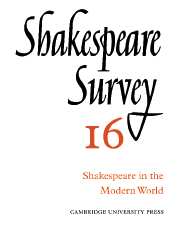Book contents
- Frontmatter
- An Obligation to Shakespeare and the Public
- Our Closeness to Shakespeare
- The Popularity of Shakespeare: An Examination of the Royal Shakespeare Theatre’s Repertory
- Shakespeare and the Fashion of These Times
- An Approach to Shakespearian Tragedy: The ‘Actor’ Image in Macbeth
- Shakespeare’s Impact Today in France
- Shakespeare and the Modern World
- Modern ‘Theatrical’ Translations of Shakespeare
- Shakespeare as ‘Corrupter of Words’
- Shakespeare in Ghana
- ‘Timon of Athens’
- Who Strutted and Bellowed?
- Shakespeare in Planché’s Extravaganzas
- ‘Our Will Shakespeare’ and Lope de Vega: An Unrecorded Contemporary Document
- Shakespeare and the Mask
- International Notes
- Shakespeare Productions in the United Kingdom: 1961
- Acting Shakespeare Today. A review of performances at the Royal Shakespeare Theatre, August 1962
- Canada’s Achievement
- 1 Critical Studies
- 2 Shakespeare’s Life, Times and Stage
- 3 Textual Studies
- Books Received
- Index
- Plate section
Shakespeare and the Modern World
Published online by Cambridge University Press: 28 March 2007
- Frontmatter
- An Obligation to Shakespeare and the Public
- Our Closeness to Shakespeare
- The Popularity of Shakespeare: An Examination of the Royal Shakespeare Theatre’s Repertory
- Shakespeare and the Fashion of These Times
- An Approach to Shakespearian Tragedy: The ‘Actor’ Image in Macbeth
- Shakespeare’s Impact Today in France
- Shakespeare and the Modern World
- Modern ‘Theatrical’ Translations of Shakespeare
- Shakespeare as ‘Corrupter of Words’
- Shakespeare in Ghana
- ‘Timon of Athens’
- Who Strutted and Bellowed?
- Shakespeare in Planché’s Extravaganzas
- ‘Our Will Shakespeare’ and Lope de Vega: An Unrecorded Contemporary Document
- Shakespeare and the Mask
- International Notes
- Shakespeare Productions in the United Kingdom: 1961
- Acting Shakespeare Today. A review of performances at the Royal Shakespeare Theatre, August 1962
- Canada’s Achievement
- 1 Critical Studies
- 2 Shakespeare’s Life, Times and Stage
- 3 Textual Studies
- Books Received
- Index
- Plate section
Summary
Today it would be a commonplace to say that the greatest poets may be read and understood anew by each age and each generation, that new aspects of their work are continually being discovered and that they appeal to each generation in a new and different manner. This statement, however, provokes the question whether the understanding and interpretation of Shakespeare in each new generation is rather a reflection of the preoccupations and contemporary problems of that generation or whether it represents a genuine advance of scholarly insight—a better, because fuller and more objective comprehension. The truth may perhaps lie between these two alternatives: for our present knowledge and appreciation of Shakespeare, besides incorporating some of our own concerns and predilections, is also cumulative; much of what was discovered in Shakespeare during the eighteenth century, the Romantic period and the later nineteenth century has been taken over by present-day criticism and has been included in and integrated into our reading of his plays. Thus an analysis of Shakespeare’s impact on the modern world would have to point out the connection existing between new and characteristic responses on the part of a modern audience to Shakespeare’s plays and the chief trend of modern Shakespeare criticism, both seen in relation to the typical problems and preoccupations of our own generation.
- Type
- Chapter
- Information
- Shakespeare Survey , pp. 57 - 62Publisher: Cambridge University PressPrint publication year: 1963
- 1
- Cited by

